

How Best to Read Auto-Fiction. I am accused of auto-fiction.
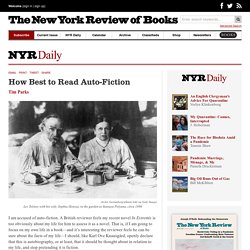
A British reviewer feels my recent novel In Extremis is too obviously about my life for him to assess it as a novel. That is, if I am going to focus on my own life in a book—and it’s interesting the reviewer feels he can be sure about the facts of my life—I should, like Karl Ove Knausgård, openly declare that this is autobiography, or at least, that it should be thought about in relation to my life, and stop pretending it is fiction. This debate is as old as the hills: there are critics who feel it’s good for the novelist to focus on his own experience, and then there are those who feel that the core of a novel must be invented. Just as there are writers who claim their work is never autobiographical, even when it seems it must be, and writers who claim their work is always autobiographical, even when it seems it can’t be.
Champions of truth and authenticity; worshipers of the artist’s untrammeled imagination. Can we say anything new about this? Drawn from life: why have novelists stopped making things up? “That was the morning that white people finally realised the president of the United States was a white supremacist, he’d as good as said so, there was a cartoon in the Guardian of the White House with a Klan hood over the roof.
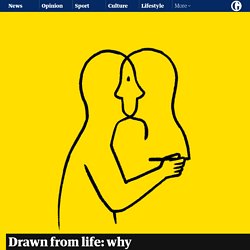
Why were people surprised, weren’t they listening to anything? ... People weren’t sane anymore, which didn’t mean they were wrong. Some sort of cord between action and consequence had been severed. How ‘Auto’ Is ‘Autofiction’? Sheila Heti.
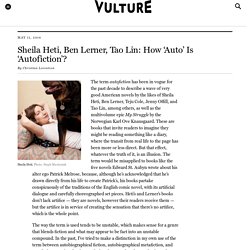
Photo: Steph Martyniuk The term autofiction has been in vogue for the past decade to describe a wave of very good American novels by the likes of Sheila Heti, Ben Lerner, Teju Cole, Jenny Offill, and Tao Lin, among others, as well as the multivolume epic My Struggle by the Norwegian Karl Ove Knausgaard. These are books that invite readers to imagine they might be reading something like a diary, where the transit from real life to the page has been more or less direct. But that effect, whatever the truth of it, is an illusion. The term would be misapplied to books like the five novels Edward St.
The way the term is used tends to be unstable, which makes sense for a genre that blends fiction and what may appear to be fact into an unstable compound. But that isn’t the only way to use the term, and because the term originated in France, Americans don’t have a firm grasp of its history and probably never will. Autobiography? Another thing about novels: It’s all in the writing. Samantha Hahn’s Beautiful Illustrations for Rachel Cusk’s “Outline” Rachel Cusk on Her Quietly Radical New Novel, Outline. Call it the semi-memoir, call it the autobiographical novel: an outpouring of deeply personal fiction from authors like Karl Ove Knausgaard, Sheila Heti, and Ben Lerner—with more on the horizon this spring—point to an increasing dissatisfaction with the conventions of fiction.
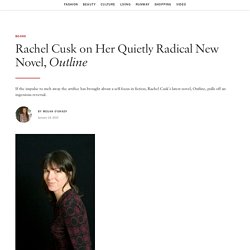
It’s shaping up to be the post-post-modern question: How do we reconcile our love of narrative with its essential fakeness? Rachel Cusk Gut-Renovates the Novel. Cusk and Scamell-Katz divide their time between Norfolk and London, where she owns a flat and her daughters go to school. “We spend most of our life in the car,” she said, “though at least we get to talk all the way.” They have been a couple for four years, and married for three. Their romance began one Christmas, when they were both without their children, and Scamell-Katz took Cusk to a wild Scottish peninsula, in the middle of a storm. I had the impression that their complicity still surprises them daily. Sunday nights at the Red Lion are a ritual of the couple’s country life, though they are otherwise homebodies. Embarrassed by Fiction. A character in Rachel Cusk’s new novel, “Outline,” a successful playwright named Anne, has been stricken with a peculiar kind of writer’s block.
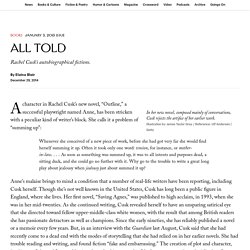
She calls it a problem of “summing up”: Whenever she conceived of a new piece of work, before she had got very far she would find herself summing it up. Often it took only one word: tension, for instance, or mother-in-law. . . . As soon as something was summed up, it was to all intents and purposes dead, a sitting duck, and she could go no further with it. Why go to the trouble to write a great long play about jealousy when jealousy just about summed it up? The Best Classic Books To Read While Self-Isolating Due To Coronavirus. Ellie Pithers, Digital Director Kudos by Rachel Cusk I read Outline, the first of Rachel Cusk’s so-called “Faye” trilogy, with my book club – and it produced a particularly vociferous, wine-fuelled debate.
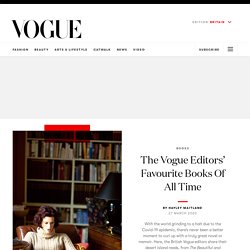
Everyone bar two of us hated it. I went on to race through the other two books in the trilogy, Transit and Kudos. “Nothing really happens,” as many of the book clubbers moaned, but I found the lack of plot to be extraordinarily intimate and ultimately freeing. Random Family: Love, Drugs, Trouble and Coming of Age in the Bronx by Adrian Nicole LeBlanc. Staff Picks: Rachel Cusk, Christine Lincoln, Mark Sundeen. The Art of Fiction No. 246. “I Don’t Think Character Exists Anymore”: A Conversation with Rachel Cusk. I’m fascinated to hear you say that because I think I’m going to do something that is usually not allowed—but I do want to talk about the very end of the book.